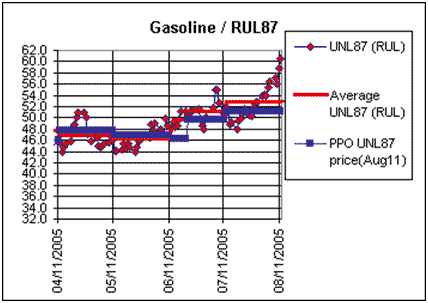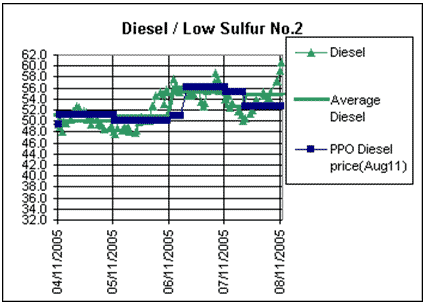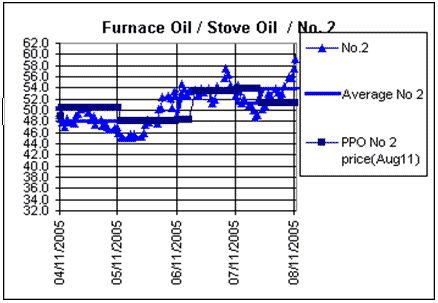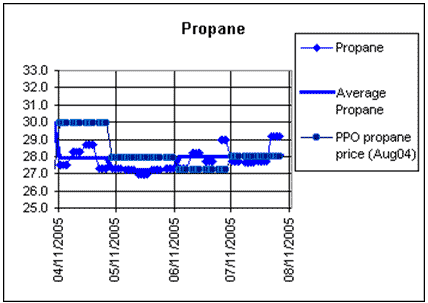|
NLIS 1
August 15, 2005
(Government Services)
The following is being distributed at the request of the Petroleum
pricing office:
Operational Review Reminder
Petroleum Pricing Office releases maximum regulated fuel prices
The Public Utilities Board�s Petroleum Pricing Office (PPO) has set
the new maximum regulated fuel prices for Newfoundland and Labrador
effective 12:01 a.m. Monday, Aug. 15, 2005.
The maximum price for all types of gasoline will increase by 1.8/1.9
cents per litre (cpl), depending on the HST rounding effect for a
particular pricing zone, while distillate fuels will also see upward
movement: furnace/stove oil by 2.61 cpl and automotive diesel by 2.5
cpl. The price of residential propane used for home heating purposes
will rise by 0.1 cpl.
David Toms, PPO director (acting), said the commodities market has
encountered another extreme period of aggressive pricing activity,
as numerous global events have placed stress on refined fuel prices
to boost them to record levels. The most significant portion of this
upward movement occurred near the end of this latest pricing period.
�It�s been an active period for fuel prices on the world market,� he
noted. �We�re seeing the prices for all refined fuels reach new
levels. The markets have responded rapidly in an upward direction as
of late to events that potentially could pose a threat to fuel
supply in a tight market. This is a global concern, and our markets,
as well as those throughout the country, are directly tied to what�s
unfolding in this volatile situation.�
ACTIVE PERIOD
The fuel-trading market continues to be subjected to the side
effects of global incidents.
The most recent pricing surge on the New York Mercantile Exchange (NYMEX)
came about after the U.S. Energy Information Administration (EIA)
report of August 10 indicated that, while oil and distillate
(furnace/stove oil and diesel) stockpiles had increased, gasoline
inventories for the world�s largest consumer had declined. This
created more fears that demand, coupled with numerous refinery
problems and outages, would result in tight gasoline supplies
available to the market. This is of particular concern as the Labour
Day weekend approaches, which is traditionally a time of increased
travel and fuel consumption.
As well, the International Energy Agency (IEA), an advisor to 26
industrialized nations, increased its estimate on the need for OPEC
(Organization of Petroleum Exporting Countries) oil later this year
because of decreased non-OPEC member output in areas such as Russia,
at the same time that global demand is forecast to increase.
The Middle East remains an area of worry for fuel traders, as
tensions and political changes could potentially lead to supply
disruptions from OPEC�s two largest oil producers � Saudi Arabia and
Iran. The death of Saudi Arabia�s King Fahd created some tension on
the fuel market, as the line of succession for future rulers of this
powerful oil-rich country was uncertain. As well, U.S. diplomatic
missions there, which include an embassy and consulates, closed for
two days amid reports of planned attacks. Saudi officials said there
was no confirmation of these threats, though concerns remained about
a fuel supply disruption from the country with the only significant
spare production capacity. As well, Iran, a major oil supplier,
began nuclear work at its uranium reprocessing plant, creating
potential for diplomatic disputes.
Other issues affecting the market include: ongoing refinery outages
while there is a reported lack of spare production capacity; fears
that forecasted tropical storms in the Gulf of Mexico would further
disrupt supply in the region; and, although distillates supplies
have risen to a higher average than a year ago, an even stronger
demand growth for these fuels, coupled with refinery problems, could
dent supplies before winter.
PETROLEUM PRICING REVIEW REMINDER
All stakeholders (both consumers and industry) are reminded of the
operational review of petroleum pricing regulation that is being
conducted by the Public Utilities Board in Newfoundland and
Labrador.
The Board publicly released two documents concerning fuel-price
regulation in the province on July 25, with a view to gathering
input and comment from interested consumer groups, industry and
individuals to assist with the decision-making process on issues
identified in these reports. The reports, entitled: �A Study of
Storage and Distribution Costs for Petroleum Products throughout
Newfoundland and Labrador� and �Review of Petroleum Pricing
Regulation Issues Discussion Document�, can be viewed in their
entirety on-line at: www.pub.nl.ca.
Comments, feedback and/or expressions of interest in the review
should be received from stakeholders by Friday, August 26 in
writing, by fax, via e-mail or web feedback through the following
means:
Contact: Ms. G. Cheryl Blundon, Director of Corporate Services and
Board Secretary
Office: Suite E210, Prince Charles Building, 120 Torbay Road, St.
John�s
In writing: P.O. Box 20140, St. John�s, NL, Canada, A1A 5B2
E-mail:
petroleum-pricing-review@pub.nl.ca
Fax: (709) 726-9604
Website: www.pub.nl.ca
The Board will consider all input received, as well as the results
of any hearings or consultations, before making decisions on the
issues that are the subject of this operational review.
BACKGROUNDER
The Board adjusts fuel prices on the 15th of each month using the
average daily prices for finished petroleum products as listed on
NYMEX (New York Mercantile Exchange). Illustrated in the following
four graphs are the market-price performances of the products
regulated by the PPO for recent regularly scheduled pricing periods
up to August 11, 2005:




1. Automotive
Fuels � Maximum Retail Pump Prices � Effective August 15, 2005
2.
Heating Fuels � Maximum Tank Wagon (**Tank Farm) Prices � Effective
August 15, 2005
3. Heating Fuels � Residential Propane
� Maximum Tank Wagon Prices � Effective August 15, 2005
Media contact: Michelle Hicks, Communications. Tel: 1-866-489-8800
or (709) 489-8837
2005 08 15 10:30 a.m.
|








